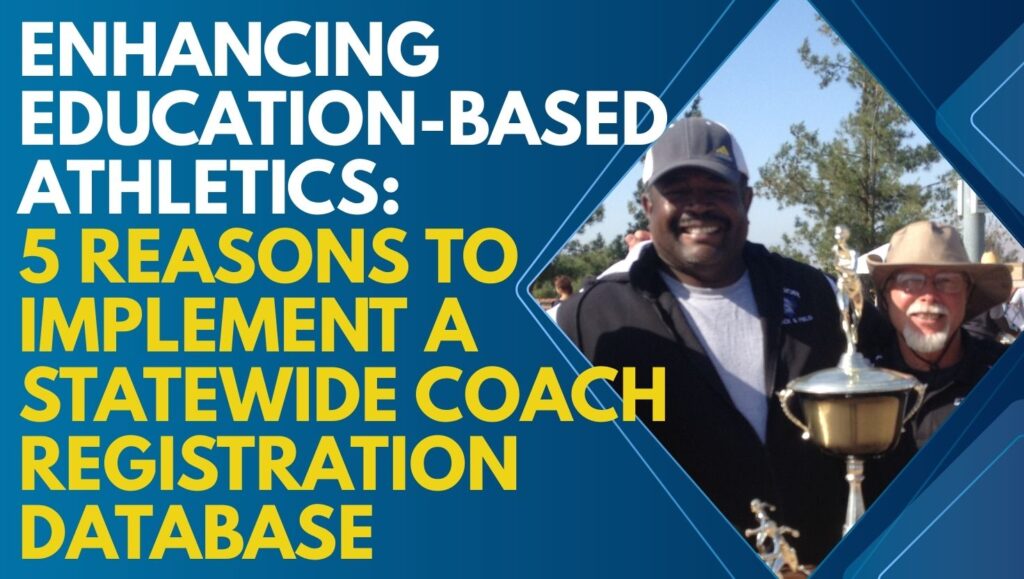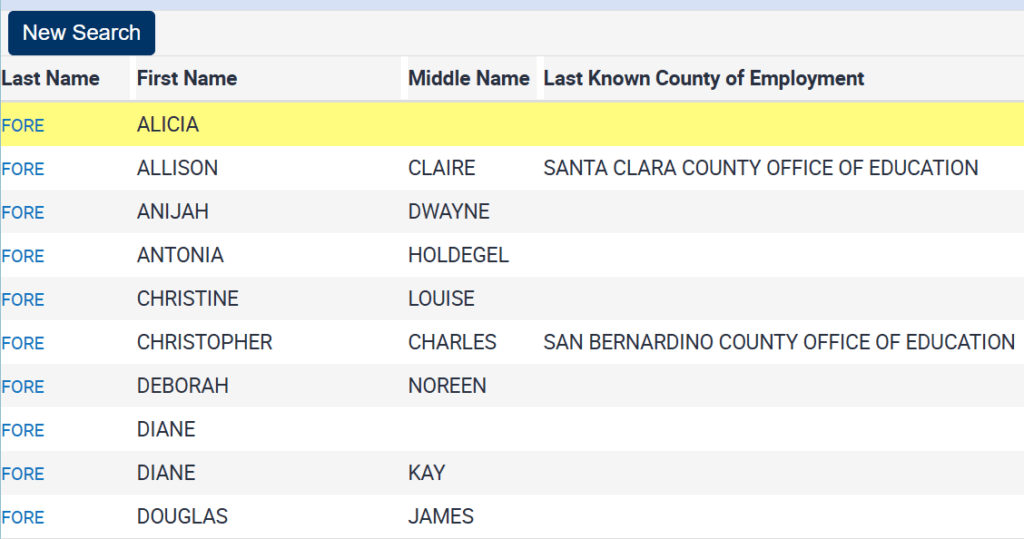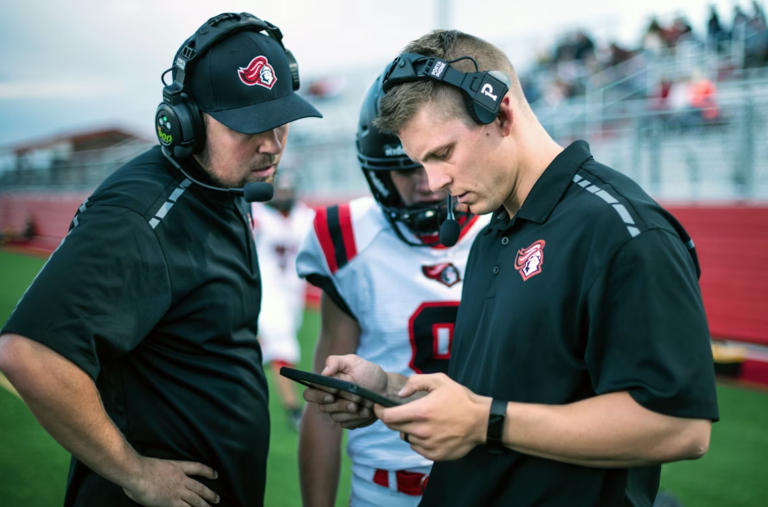
When an adult comes to my campus (I’m a Principal) to meet with a student or to visit a classroom for any reason, a social worker, a counselor or a parent delivering party goods to their child’s classroom, they must present a form of government ID which is ran through a reader that will alert us if that person has a criminal history that involves crimes against children. I get called to the office, look at the alert, and make a decision about the person visiting our campus or not. If they do visit campus, I must escort them at all times. This is a tool to safeguard our students; it is called Raptor.
Here in California, there really is no “Raptor” for bad coaches, those who blatantly violate CIF rules and regulations.
We desperately need one now, more than ever in my opinion. We do not have this type of tool to help protect our student-athletes. I’m not talking about protecting them from crimes, we have that tool; it’s fingerprints that coaches must submit before coaching. I’m talking about protecting their eligibility to participate in sports, and protecting the integrity of the school and athletic program.
I recently spoke with an Athletic Director who asked me “Why doesn’t CIF do anything to these coaches who just move from school to school to school breaking rules?” It is what got me thinking about this concept you’re going to read about.
Further, recently here in Southern California (there is no reason to name names with this article), we have seen an influx of student-athletes losing eligibility because of illegitimate coaches who have tried to transfer kids to schools, lying on paperwork, lying about pre-enrollment contact, paying players or facilitating that to happen, etc. etc.
And some of these grown men adults have moved from one school to another and another.
Why have rule breaking coaches been allowed to move from school to school to continue to violate rules and procedures?
Because there is no mechanism that tracks coaches, and their violations of CIF rules! For teachers in California, we have the Commission on Teacher Credentialing. You can look up any teacher in California, and see if they have ever had their credential suspended.
Why can’t we create a similar system with coaches in California?
These “street agent” types of coaches, and even some of these coaches who work in education and break the rules, aren’t going away any time soon. With the money in NIL, the increasing pressures to earn a scholarship, etc. it’s only going to keep getting worse. Many of these coaches who do not care about the mission of CIF as an “education-based” athletic program, do not understand CIF rules, do not agree with CIF rules, and do not ultimately care about the eligibility of student-athletes at the end of the day.
I like to have solutions, not just talk about problems. I have a solution to this problem of schools hiring coaches who have broken CIF rules, policies and procedures over the years.
To combat this coaching problem, the CIF should establish a statewide coach registration system just like teachers have. In order for a coach to be hired, they would need to complete a simple, free online certification on CIF rules, which would automatically populate the database. (They would need to take this CIF rules training every other year, similar to CPR.)

Violations of CIF bylaws, such as undue influence or undisclosed pre-enrollment contact (bylaw 510), or helping families to violate CIF bylaw 202, providing accurate information, would flag a coach for a set period of years, based on investigations by CIF section offices. A coach would not be flagged by the CIF Section Office until they exhausted any appeals process through the office.
When hiring coaches, Athletic Directors or Principals could quickly verify certification and check for flags. This system would help us to greatly professionalize coaching, safeguard education-based values, and hold coaches accountable. Here are five compelling reasons to make this a reality.

I come to the discussion table with more than a quarter century of experience in California athletics. I started coaching in the 1990s at my Alma Mater. I’ve been an Assistant Coach, Head Coach, Athletic Director, Assistant Principal of Athletics, and Principal. I have spent time as a Board Member with the Southern California Football Coaches Association, and spent 7 years in leadership with the California Coaches Association, 3 as the President. Part of my role as the President was serving on the CIF Federated Council, the highest legislative body of governance in the state. Since 2015, I have served as an Expert Witness in court cases, and have seen some VERY shady coaches who not only broke CIF rules, but harmed kids in even worse ways, move from school to school. I share this experience to show readers that I understand high school athletics from multiple perspectives.
Here are 5 reasons to implement a statewide coaching database
A database would play a significant role in the mobility of rule-breakers and “street agents.”
Currently, coaches who flagrantly violate CIF regulations—recruiting students improperly or engaging in undue influence—face almost no long-term consequences or repercussions for their actions. Students lose eligibility, sometimes for up to 24 months, while the coaches keep coaching! That is wrong! They can resign or be dismissed from one school and seamlessly land at another, often in a different district or one of the ten different CIF sections across the state. Without a statewide database, Principals and Athletic Directors rely on informal networks or incomplete background checks, which personnel laws in California very often limit from revealing CIF-specific infractions. A flagged profile would alert hiring officials to past violations, deterring schools from onboarding repeat offenders.
The database would reinforce the core mission of education-based athletics.
CIF sports aren’t about elite training camps or profit-driven schemes; they’re extensions of the classroom, emphasizing character development and holistic student success. Coaches who don’t align with this, those acting as “street agents” funneling athletes for personal networks—undermine the system. By requiring a CIF rules certification, the database ensures every coach understands and commits to these principles. Hopefully, we would see this alignment elevate the quality of coaching statewide, prioritizing education over exploitation.
A database enhances accountability and due diligence in hiring.
Schools already mandate certifications for first aid, CPR, heat illness, and numerous other safety measures—why not add CIF compliance to this checklist? Something very simple. A PowerPoint and video of no more than 30 minutes which cover transfer rules, and eligibility status for student-athletes. The proposed system integrates seamlessly: coaches complete the certification, and their status populates the database automatically. When districts hire, it’s a simple checklist item—log into the CIF-managed site to confirm completion and scan for flags. In an era where personnel laws restrict sharing disciplinary details, this CIF-specific tool helps to fill a void, empowering leaders to make informed decisions without legal hurdles. One AD I sent this article to asked if there were any legal or privacy regulations that would prevent a system like this? I pointed him to the Commission on Teacher Credentialing as a sample for what this coach process might look like.

Fourth, it protects student-athletes, schools, and communities from detrimental impacts. Bad coaches don’t just bend rules—they can erode trust, foster toxic environments, and expose kids to risks like improper recruitment which can in turn make them ineligible to participate. Communities suffer too, as scandals tarnish school reputations and divide stakeholders. A database with flags for verified violations would act as a preventive shield, reducing the influx of such problems.
For instance, a coach cited for not disclosing pre-enrollment contact couldn’t hide it; the flag would prompt deeper scrutiny, and even prevent that coach from coaching for a certain period of time. This proactive approach safeguards vulnerable students, maintains program integrity, and fosters healthier athletic cultures across California.
One Athletic Director who saw a draft of this article said “I love the idea. I think we need to do what we can to clean this mess up as much as possible. Case in point, I had a kid transfer situation where there was very clear pre-enrollment contact. I reported what we knew about their coach contacting our kid directly to the Athletic Director. The kid was ruled ineligible but the Assistant Coach who violated the rules, and helped the family violate the rules, which was in fact verified by the CIF office, was on the sidelines coaching the next day. I like how this shines a light on it a little bit for those who blatantly ignore the rules and it helps those of us who do care to avoid bringing on the wrong people.”

Finally, implementing this database would play a key role in professionalizing the coaching ranks, thus elevating the entire profession. Coaching in high schools should mirror the standards of educators, with clear qualifications and oversight. By adding CIF certification to existing requirements, we create a unified standard that weeds out those unfit for education-based roles. This isn’t about bureaucracy—it’s about efficiency and excellence. A centralized, user-friendly system overseen by the CIF will assist Administrators with the hiring process by flagging coaches with a history of violating CIF rules, while emphasizing to aspiring coaches the importance of integrity.
In conclusion, a statewide coach registration database isn’t just an idea—it’s a necessity for preserving the soul of CIF education-based athletics. By tracking CIF education certifications and violations, we can halt the spread of non-education-focused coaching, protect our student-athletes, and build a more accountable system. California, with its vast network of schools, deserves this innovation to ensure sports remain a force for good.
Chris Fore is a veteran Administrator, Athletic Director, and Head Football Coach from Southern California; he currently serves as a Principal. He has written four books and produced coaching manuals, available at EightLaces.org. Fore holds a Master’s in Coaching and Athletic Administration and multiple education credentials. A Certified Athletic Administrator, he served as the President of the California Coaches Association (2018–2021) and has held various other leadership roles in several different organizations. A sought-after speaker, Fore has contributed to national sports publications and appeared on radio and podcasts. He also serves as an expert witness in athletic lawsuits. Follow him on X!


